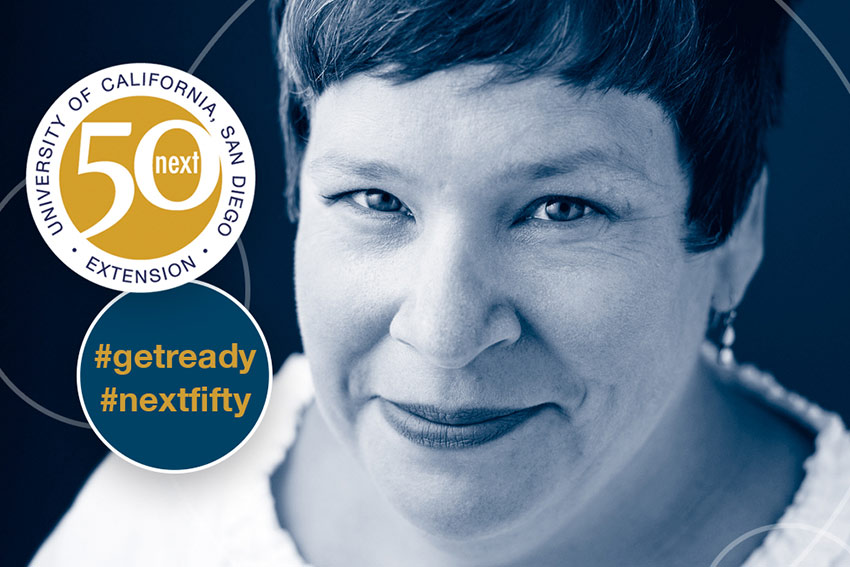16 August 2016
50 Voices of the Future: Marcie Wessels on the fate of children’s books

(Photo of Marcie Wessels by Roxyanne Young)
In honor of UC San Diego Extension’s first 50 years, 50 Voices of the Future asks thought leaders about the trends, breakthroughs and social advances they foresee over the next 50 years.
It might seem both tempting and cynical to conclude that book reading is going extinct, especially among kids, who live in an age of virtual reality and other fast-evolving forms of gadgetry. But many authors, Marcie Wessels among them, don’t buy this type of thinking. The way Wessels sees it, as long as your story is well-told, you’ll find an audience, even if that story comes in the form of words written on hundreds of pages of paper, with a spine holding all that paper together. Wessels – a children’s author whose first book, Pirate’s Lullaby, was published last year – believes the written word will always have the power to connect with people. Of course, when your target audience is the very youngest of readers, having some pictures alongside those words is always helpful, too.
(1) Why is the work you do important?
I tell stories and stories are what connect us. They are what have always connected us and what will always connect us. Books and stories are windows and mirrors. They’re a way for us to understand ourselves and our experiences. But they’re also a window into other cultures and other lives. Books in general help us become more empathic and open-minded. And with children, books can open up a whole new world. Children are naturally curious and books fulfill their desire for knowledge and can ignite their own curiosities.
(2) What are the influential/exciting developments happening in your field now and why?
The We Need Diverse Books Movement. It was started by people in the kid-lit world who feel minorities and different points of view aren’t represented within the canon of children’s literature. The population of the United States is changing, and its cultural diversity should be better reflected in our literature. Everyone should have access to books. And everyone should have access to telling his or her own story.
(3) What’s the next big thing
New technologies like e-books are giving more people access to a platform for telling their stories. But there is also a renaissance of sorts in traditional publishing for children. Some of the most talented writers and illustrators are creating beautiful pieces of art in a form that is underappreciated – picture books. There’s an increased respect for visual story-telling. Look at the growing popularity of graphic novels or highly illustrated stories. There’s a need for that, a call for that. My son was a bit of a reluctant reader but when I gave him a graphic novel, it opened up a completely new world for him.
(4) How big an impact will your field play in shaping the future of the San Diego region and beyond?
I read somewhere that 20 percent of people in San Diego County are either illiterate or functionally illiterate, which is a huge problem. It can be prevented in future generations by instilling in kids a lifelong love of reading and learning. In the spring, I had the opportunity to partner with Words Alive, a local literacy organization, which goes into underserved schools and does story time with the kids. It was exciting to work with others in the community who are also interested in putting books into the hands of kids – kids that might not otherwise have access. If I go out into the community, do a story time and inspire one child to read, I feel I’ve done my job.
(5) Hop into your time machine…what does the future look like for this field in 50 years? How can individuals/companies get prepared for what’s next?
In recent years, publishers have created enhanced e-books that embed music or videos or link to content on the web. This may be just one of the ways we tell stories in the future. But books will always exist. The medium we use to tell a story may change, but stories will always be told. Stories fulfill a basic human need. Who doesn’t love a good story?
Learn more about the UC San Diego Extension specialized certificates in Children’s Book Writing and Children’s Book Illustration on our website, or view the online information session on YouTube.